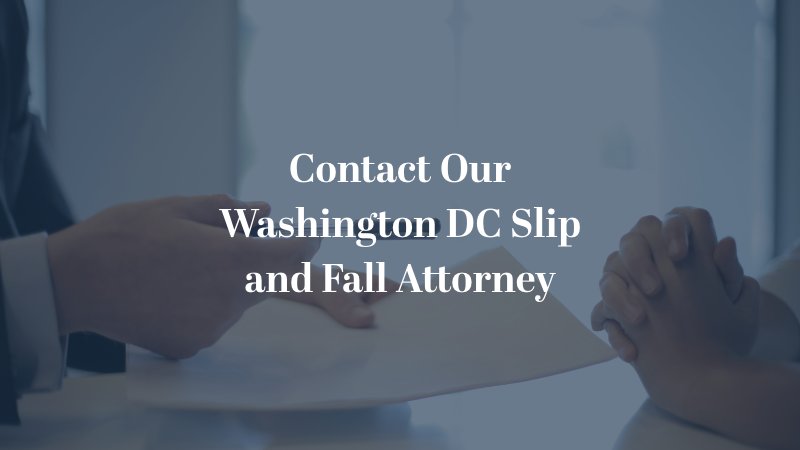Understanding the concept of “duty of care” is crucial if you’ve suffered an injury in a slip and fall accident in Washington, DC. These cases hinge on legal terms that spell out when a property owner or business is responsible for your damages and when they are not.
Knowing exactly what duty they owed you and whether they met or breached that responsibility is how you prove if someone else should be liable for your injuries and losses. Reach out to our experienced slip and fall accident lawyer in Washington DC for a free consultation.

What “Duty of Care” Means
In Washington, DC, “duty of care” refers to the legal responsibility that property owners and occupiers have to keep their property reasonably safe for people who enter it.
If a property owner doesn’t take reasonable steps to fix, warn about, or regularly check for hazards, they may breach this duty and can be held legally liable for any harm directly caused by their failure.
Duty of Care and Visitor Status
The specific duty of care a property owner owes to you depends on your legal status when you enter their property. DC law separates people into different categories, with each owed a different level of protection.
Invitee
An invitee is someone who is on another person’s property with permission of the owner/operator and for a business or commercial purpose. Examples include a customer at a business or a diner at a restaurant. In these cases, owners must make reasonable efforts to keep spaces safe, check routinely for possible hazards, remove or fix problems quickly, and post warnings for anything they can’t immediately address.
Licensee
Social guests, like friends visiting your home or acquaintances at a party, are known as licensees. For these visitors, the property owner’s main responsibility is to warn about any dangers they know exist but aren’t obvious to the guest. Owners can’t purposely or recklessly harm a licensee but are not required to inspect for every new problem.
Trespasser
Trespassers are people who enter a property without any right to be there. For these individuals, owners generally only need to refrain from willfully or wantonly harming them, except in certain situations involving children.
The “attractive nuisance doctrine” creates a slightly higher standard of care for things likely to attract and harm unsupervised kids. In these cases, owners must take precaution to protect children trespassers from getting injured as a result. Knowing how the law defines your visitor status helps you understand what protections you should expect and whether a property owner may be responsible for your slip and fall injury.
How Plaintiffs Show the Duty Was Violated
Proving that a property owner violated their duty of care is the foundation of every premises liability case. Plaintiffs must gather evidence to demonstrate that the owner was negligent in how they maintained or failed to maintain the premises. Here’s how this usually works:
Existence of a Hazardous Condition
The first step is showing there was a specific, identifiable danger present on the property, like slippery floors without warning signs, uneven ground, stray cords, or broken handrails. Strong claims usually include photographs, maintenance records, or incident reports that document the issue and show it existed when you fell.
Knowledge or Reasonable Notice
It isn’t enough for the property just to be dangerous; a plaintiff must show the owner, manager, or responsible party either actually knew about the hazard or that it had existed for such a period that any reasonable person would have discovered it. This often requires evidence like previous complaints, surveillance video, incident logs, or proving the condition would have been seen during routine inspection.
Failure to Take Reasonable Action
A successful claim will demonstrate the property owner failed to act promptly or appropriately after being notified (or supposedly discovering) the hazardous situation.
Clear Link Between Hazard and Injury
You must also show that your slip and fall directly resulted from the hazardous condition. Medical documentation, witness accounts, time-stamped photos, or accident scene videos can be essential for making this connection.
If you or a loved one suffered an injury due to a dangerous condition in a public or private place, evidence is critical. Contact Lightfoot Law, PLLC today to schedule a free consultation so our personal injury lawyers can review your case and help you get the justice and compensation you deserve for your injuries.